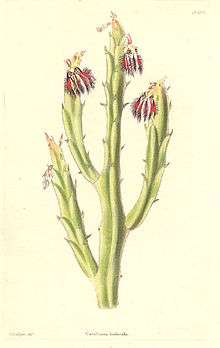Caralluma adscendens
| Caralluma adscendens | |
|---|---|
 | |
| 1832 botanical illustration of C. fimbriata, a synonym of Caralluma adscendens | |
| Scientific classification | |
| Kingdom: | Plantae |
| (unranked): | Angiosperms |
| (unranked): | Eudicots |
| (unranked): | Asterids |
| Order: | Gentianales |
| Family: | Asclepiadaceae |
| Subfamily: | Asclepiadoideae |
| Genus: | Caralluma |
| Species: | C. adscendens |
| Binomial name | |
| Caralluma adscendens | |
| Synonyms[1] | |
| |
Caralluma adscendens is a succulent plant in the family Apocynaceae. Its distribution ranges from India and Sri Lanka through the Arabian peninsula to North Africa and the Sahel.
Use
C. adscendens has been eaten in rural India for centuries, raw, as a vegetable with spices, or preserved in chutneys and pickles, and is often found as a roadside shrub or boundary marker.
It has been used as a portable food and thirst quencher for hunting. Tribesmen on a day's hunt will often only pack some Caralluma fimbriata to sustain themselves and it is commonly known as "famine food" in India.
Consumer issues
Various diet pills claiming to contain Caralluma fimbriata extracts are marketed for weight loss. A study published by the US NIH in 2015 showed the supplement to be well-tolerated, but to have no clinical effect compared to a placebo at the supposedly therapeutic dose of 1g daily[2]
Chemistry
The key phytochemical constituents of the herb are pregnane glycosides, flavone glycosides, megastigmane glycosides, and saponins. active constituents- caratuberoside I-X,tomentogenin, silolsterol, luteolin-4-neohesperidoside and kaemferol-7-0- neohesperidoside.
References
- ↑ "The Plant List: A Working List of All Plant Species". Retrieved 15 January 2014.
- ↑ Arora, E; Khajuria, V; Tandon, VR; Sharma, A; Mahajan, A; Gillani, ZH; Choudhary, N. "To evaluate efficacy and safety of Caralluma fimbriata in overweight and obese patients: A randomized, single blinded, placebo control trial". Perspect Clin Res. 6: 39–44. doi:10.4103/2229-3485.148812. PMC 4314845. PMID 25657901.
External links
| Wikimedia Commons has media related to Caralluma adscendens. |